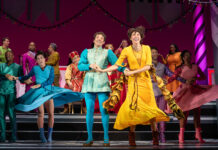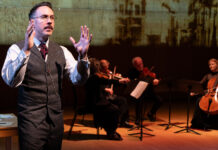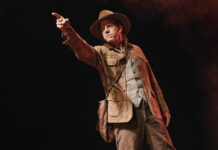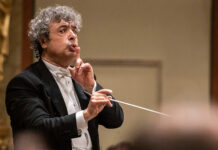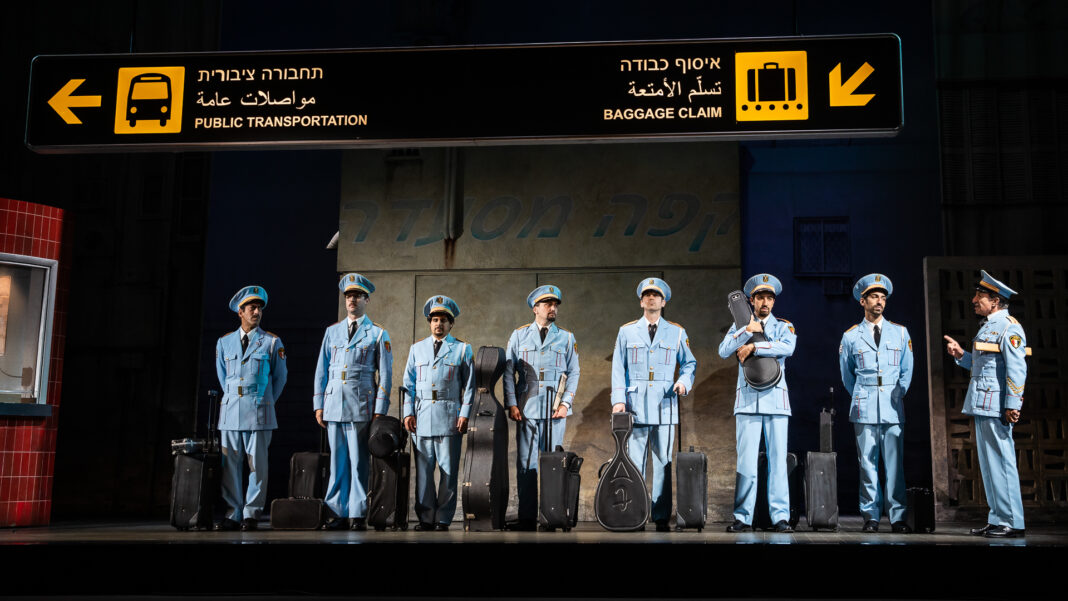There’s something sneaky about the Tony Award-winning musical The Band’s Visit. It’s not seeking your approval. It’s not telling you everything you need to know in the biggest possible way. It’s not even making clear everything that is revealed during the course of a performance. Rather, it quietly tells its story and asks each of us as viewers to bring our own perspectives to the musical.
This story about an Egyptian band that heads to the wrong town and ends up in Israel is based on the film of the same name by Eran Kolirin. Underlying both the film and the musical is a story about people you wouldn’t expect to necessarily help one another, if you believe that the politics of the two country’s leaders is mirrored in the belief system of all its peoples.
This was just one topic I discussed last December when I had a chance to speak with Janet Dacal who plays “Dina,” Coby Getzug who plays “Papi” and Joe Joseph who plays “Haled.” You might recall I also spoke with Sasson Gabay who plays “Tewfiq.” He played the same part in the film. To see my interview with Gabay, please go here.
As The Band’s Visit continues its tour across America through the end of July, my conversation with the three actors seems more timely than we could ever have imagined. What follows are excerpts from those conversations that have been edited for length and clarity.
There is a lot of the story that isn’t specified for the audience in The Band’s Visit. How much latitude do you and the creators give audience members to fill in the blanks or come to their own conclusions about these character’s lives?
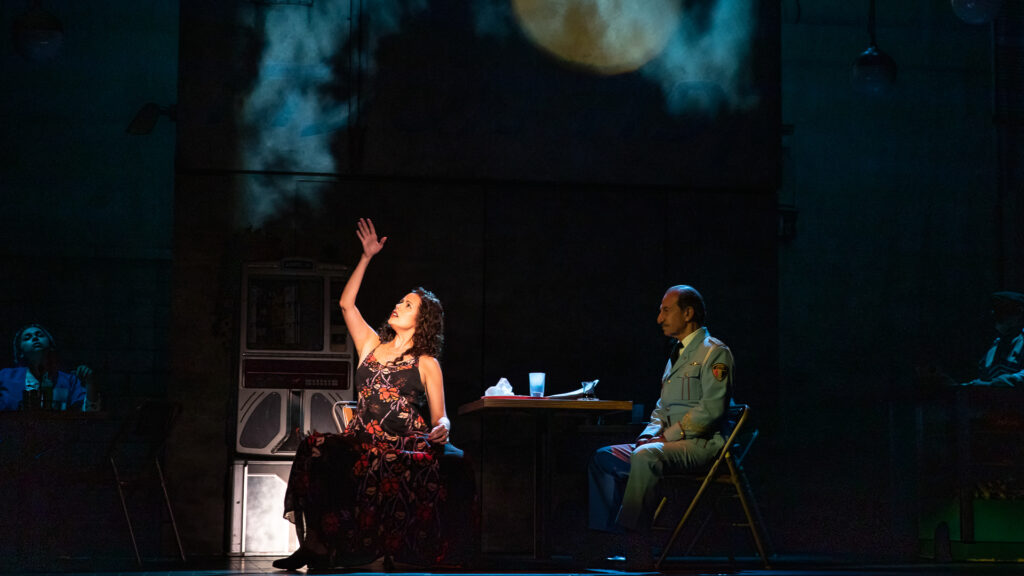
Dacal: What’s so beautiful about art is we see ourselves on the stage and the things that aren’t explicitly exposed, those illusions, we get to fill in the holes. It’s like any piece of art, right? You see it. You connect to it in whatever way you see what you see through your own life experience and your lens. And that’s one of the most beautiful things about the musical theater art form. You fill in the silences, fill in what’s not obvious, because of the life that you have led.
Joseph: You’re picking up on something that’s my favorite aspect of the show. You see this very sort of short glimpse of these people’s lives and the things that happen to them are not momentous. They’re not these big, dramatic changes of character. Human lives are not that exceptional and people don’t change as dynamically as they do in musicals. We love to see that on stage because it’s so different from human life. But the beauty of this show is that there is this ambiguity that’s preserved in the show.
Getzug: I think one of the one of the most powerful aspects of it is that there are those silences left for people to draw their own conclusions because those are the windows that people are able to make their own connections to the show and relate to. I think that there’s something powerful about leaving some of those questions unanswered because it allows an audience member to interpret it in the lens of their own experience and maybe give them new perspective over things that have happened in their life or their own experiences.
I also feel like there’s a bigger picture here, which is that government ideologies and differences are not always reflected in the people. How much of that is part of the subtext of what you are trying to get across in the show?
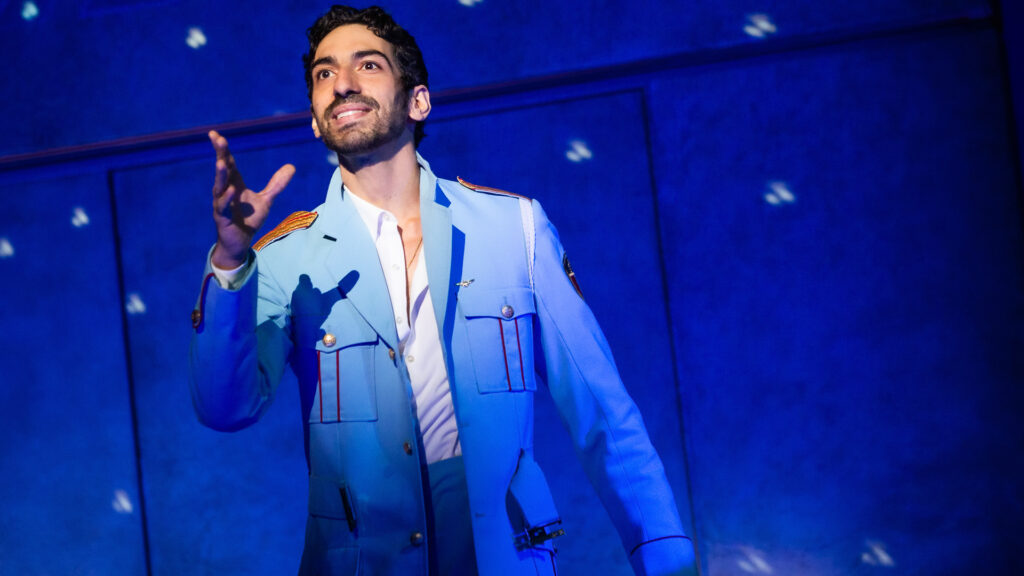
Getzug: I think that there’s something really special about seeing people that you would expect not to get along based on whatever is happening on a larger scale from the countries that they’re from. That’s what’s happening in the world, too.
Dacal: It’s one of the big things that we’re intentionally getting across in the show is that when there is a problem I think human nature is to want to help each other and that is what happens in the show.
Joseph: When you take [The Band’s Visit] around the country you get to share, especially a show like this, and realize that there’s a universality to these experiences denuded of the specificity of this literal physical world that this story exists and in the film existed in. And that as a species of social animals, as people who longed to have our soul sort of acknowledged, that there are people all around the country who want that experience because sometimes they feel like they’re just not getting it.
Getzug: I think that what’s so cool about this piece is that these people are from a region that has historically been steeped in conflict and a lot of tension. But the story is not about that. It’s about people immediately reaching out and saying how can I help you and how can we connect and how can we get through this together? That’s a really beautiful example of how no matter what’s going on politically in the country that you’re in or where you’re from we still have that ability to connect with each other.
Perhaps it’s time for many of the world’s leaders to catch a performance of The Band’s Visit. If you’d like to see if the show is coming to your town, click on the link in the fourth paragraph.
Main photo: The company of The Band’s Visit (Photo by Evan Zimmerman, Murphy Made/Courtesy Segerstrom Center for the Arts)


